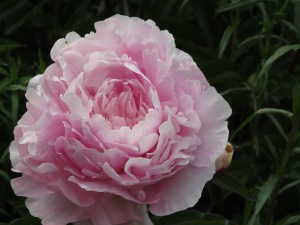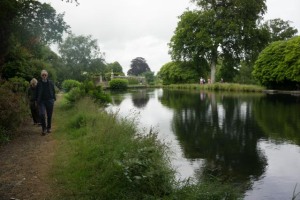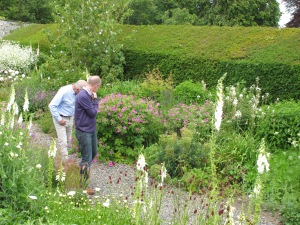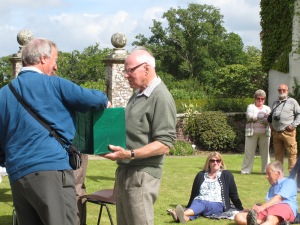Is anything more English than tea on the lawn of a great house? We’ve were talking about stereotypes since I fell for an inaccurate one about Americans, but linking tea on the lawn—especially the lawn of a great house—to Englishness seems like a safer gamble. (Feel free to take me apart on that if I’m wrong.)
Recently, Wild Thing and I went to a cream tea at Penhele, a great house not from where we live. It was a fundraiser for the Charles Causley Trust, which (I just checked the website) keeps alive the memory of a local poet and promotes writing in the region where he lived. I’d love to give you a link to some of his poems, but although I’ve been impressed by some of his poetry I didn’t like the only one I found online. Others are under copyright and that makes them a no-go zone. Sorry.
But we didn’t go there to support the Causley Trust. In fact, we didn’t know what the event was raising money for. We didn’t even go for the cream tea, although it was a welcome bonus. What we really wanted was to see the gardens and the house, which are well enough known around here that we ran into half the village almost as soon as we walked in. One of them, J., was a carpenter before he retired (only they say joiner here, or builder, and I’m not all that sure what the difference is) and worked restoring historic buildings. Basically, once he’s done you can’t tell he’s been there. I asked if he knew how old the house was and he pointed to a stone plaque above a doorway in what he told me was the hall. It carried a date in the 1600s—1660, if I remember right. For all I know, other parts are older.
“I worked on those windows,” he said, pointing to the right of the plaque.
I felt like I was sitting next to a rock star.
Most of us—maybe all of us—lined up to buy tea and either scones with jam and clotted
cream (that’s the cream part of a cream tea) or cake, then we drifted along paths and past fields, a lake, a swimming pool (covered), in and out of a series of open rooms formed by a high, dense hedge, and past an empty flowerpot stuck deep into the hedge and looking like a place for someone to hide his or her cigarettes, although I didn’t reach in to be sure since that seemed like an invasion. We paid closest attention to what I’ve learned to call a herbaceous border (you pronounce the H on herb here; I still don’t, but I’ve gotten to the point where both pronunciations sound odd to me), stopping to admire this flower and that one.
According to Wikipedia, herbaceous borders became popular in the Victorian era. They’re basically a bunch of flowering plants—what I’d call a flower bed—and they’re gorgeous but take a lot of work. The Wikipedia entry talks about digging up and splitting and replacing plants, but even more than that they take weeding. Endless weeding.
Did I happen to mention how many weeds Wild Thing and I have grown since I started blogging?
I overheard several people saying the same thing that came to my mind: “I wonder how many people it takes to keep it looking like this.” No one had the answer, but quite a few seemed like a fair guess.
It all felt a bit like something out of a BBC costume drama—the great house opened for an afternoon so the villagers could put on their company manners and enjoy a day out. It’s less lord-and-lady-of-the-manor these days, but you can’t help noticing the difference between the place you’re admiring and whatever you call home. Still, whatever people’s feelings were about class and inequality—and I expect they ranged all over the scale—everybody seemed willing to put that aside for the day and enjoy the beauty and the hospitality.
Both class and people’s feelings about class are more open in the U.K. than in the U.S.,  where we break out in a rash if anyone uses the word in any context except middle. And the tradition of a grand house opening its gardens to the public is also something I never heard of in the U.S. Wild Thing and I speculated on whether it dates back to Victorian times or to the medieval period. I’d put my money on medieval, because, as crushing as the lord-peasant relationship must have been, it did lay a few obligations on the lord, and those may have included fetes or feasts.
where we break out in a rash if anyone uses the word in any context except middle. And the tradition of a grand house opening its gardens to the public is also something I never heard of in the U.S. Wild Thing and I speculated on whether it dates back to Victorian times or to the medieval period. I’d put my money on medieval, because, as crushing as the lord-peasant relationship must have been, it did lay a few obligations on the lord, and those may have included fetes or feasts.
But that’s guesswork. What’s certain (or as certain as I dare be about anything right now) is that the tradition of great houses opening their grounds for fundraisers is part of an English summer.
At the end of the afternoon came the drawing for the raffle. You can’t hold a fundraiser in Cornwall without holding a raffle. There’s no law on the books, but it’s just not done. So at Penhele they held a raffle. And we didn’t win anything.






yes…I am with you on this one…this is very english!
although to make it even more English you would need to be still sitting out there despite the torrential rain and saying things like “could be worse, eh old chap?” and “it is only a bit of water”
incidentally, talking about class, there are apparently some new ones now…the BBC did a quiz so you can find out which one you are:
http://www.bbc.co.uk/news/magazine-22000973
LikeLiked by 1 person
In the interests of research, I followed the link, left all the questions blank (although I could have checked all the boxes except one on which groups I knew socially) and hoped I’d find the list of classes at the end. I didn’t. Instead it told me I was traditional working class. So the traditional working class goes through a questionnaire leaving all the boxes blank.
Now you know.
LikeLiked by 1 person
the class list is at the bottom and seems to go like this:
Elite, established middle class, technical middle class, new affluent workers, traditional working class, emergent service workers, precariat.
I am not 100% sure what all that means apart from it is more complicated than people think…
LikeLiked by 1 person
I’d guess it means the times they are a-changin’. But we do get into a snarl when we try to identify the classes without first defining what we mean by class. Are we basing it on income, culture, skill, education, economic / political power, or a person’s structural relationship to the economy? Or some mix of the above? No wonder it gets complicated.
LikeLiked by 1 person
It is crazy isn’t it! I think in the past (in the UK) it was based mainly on money which was equated with power, but as you say there are so many other factors!
When I did my social science module there were even more classes identified and it had as much to do with identity as anything else!
LikeLiked by 1 person
Yes, identity. I left that off my list. In the U.S. we simplify it by all claiming we’re middle class. It’s insane, but it’s simple.
LikeLiked by 1 person
It sounds much simpler…
except that you then end up with an infinitely graduated middle class which eventually boils down to not really the middle :-)
LikeLiked by 1 person
Exactly. It reminds me of the way Garrison Keillor introduces his fictional Lake Woebegone, “Where all the…children are above average.” It leaves us all a bit muddle-headed about what’s really going on.
LikeLiked by 1 person
You can identify a truly middle-class American, if he or she self-describes as “comfortable”.
LikeLiked by 1 person
I hadn’t thought of that, but you’re right.
LikeLike
Tea on the lawn, fabulous! It is incredibly English, even though our unpredictable weather does not allow for it as regularly as one might like. I had not thought about the class situation until you mentioned it here – we are quite open about it and very matter-of-fact. I think this is because it is more important to have class than to be of a certain class, if you know what I mean. Trying to be something that you are not is not classy, but you can be working class and proud and that makes you just as good as the nobility. It is pretentions that irk the English, not class.
LikeLiked by 1 person
A grand house opening is mentioned in Bleak House, so mid-Victorian England. But it was essentially a guided tour of the house while the Master and Mistress were away…
I don’t think that there were fetes or fairs on the house lawns. Some of the owners of big houses paid to have whole villages (and therefore peasant populations) moved away from sight of their big houses, so I don’t imagine that they would be interested in having the peasants over once a year to ruin the lawn. Fairs generally are ‘owned’ by municipalities, and so an annual fair would surely take place in the town or village, rather than on the lawn of the big house.
Pure guesswork on my part… it’s too hot to do any research… :)
LikeLiked by 1 person
There’s a similar scene in–is it Pride and Prejudice?
Thanks for the background. It may be guesswork but it sounds convincing. And I just found the typo. I got the second comment first and was looking in the body of the post, wondering what on earth I said about moving whole villages.
LikeLiked by 1 person
Haha sorry! And yes, I’m sure you are right about P and P…
LikeLiked by 1 person
Small typo… ‘… villages MOVED away…’ . Sorry…
LikeLiked by 1 person
Ack! I can’t find it. What paragraph is it in?
LikeLike
Er … There is nothing like a good cream tea. Apparently, Portergirl here likes to take tea in her bowler. Make of that what you will. Tea … country house … served up by a Miss Marple lookalike in a leather jumpsuit.
Oh dear. I’ve gone too far. And don’t even get me started on this raffle thing.
LikeLiked by 1 person
We have a Miss Marple lookalike in the village, but I don’t expect to see her in a leather jumpsuit. Ever. And–well, the tea wasn’t actually in our village, just near it. No Marples sighted, sadly.
I do have to write a post about raffles. Really I do.
LikeLike
What’s more perfect than tea on the lawn ? One thing I have seen in the U.S. a lot is when folks open up their homes for tours during Christmas season. Perfectly decorated, often with succulent aromas..bread baking, turkey in the oven, candles everywhere…it’s really quite nice. It is usually sponsored by local women’s groups and often involves fund raising. ☺
LikeLiked by 2 people
What part of the country are you in? I’ve never seen that done.
LikeLiked by 1 person
I’ve seen it in South Carolina, Michigan, and Pennsylvania, where I live now. ☺ It sometimes features older, historic homes. Lovely.
LikeLiked by 1 person
Thanks. There’s something wonderful about–oh, let’s be honest–snooping in someone else’s life.
LikeLiked by 1 person
True enough…but it can be pricey. Anywhere from $25. to $50 per person.
LikeLiked by 1 person
Ouch. I think I’d just keep my snoopy nose out of their business, then.
LikeLiked by 1 person
Funny. It was a tax write-off, if that helps, and they often choose very worthy charities. But, when it all comes down to it, it is little more than snooping. Thanks, Ellen.
LikeLiked by 1 person
I’m in Bucks County, Pennsylvania, and the neighborhood I live in does this every year (“Christmas House Tour”) to benefit the homeless. Fortunately (unfortunately?) my house is not part of the tour. Not sure there would be much interest, although I’d be willing to give a tour of my house, and point out the lopsided Christmas tree that’s overwhelming (and dropping a carpet of needles on) our tiny living room, the two cats hiding under the bed, the bewildered family seated around a dining room table that’s covered with my “work-product,” and the kitchen floor that needs to be mopped.
Also, I could take the tour down into the basement and show them the string of lights I forgot to put up.
Happy Fourth. I hope you’re over there performing some small act of rebellion today, like refusing to pronounce the letter “U” in all those words that don’t need a letter “U.”
LikeLiked by 2 people
They don’t do that in our neighborhood. It’s just as well.
“Here are the only Jews in a 5 block radius. You can tell by the pathetic light-up menorah in the window.”
LikeLiked by 2 people
You may not have won anything but you got some great photos.
LikeLiked by 1 person
Thanks. And I won a fine day out, so I’m not complaining.
LikeLiked by 1 person
What a lovely way to spend the day. Don’t worry about not winning the raffle, it’s the taking part that counts (another English way of life!). The first photo of flowers – they are called astrantia, have lots in my garden and bees love them in case you are in to that sort of thing. The second photo – they are peonies. I’d like to think the class thing has flattened out somewhat these days, even the ‘upper’ class have to work for a living. I’m sure it still exists should you want your child to attend Eton etc – not something likely to cause the majority of us sleepless nights. Your friend J and people like him are true class – skilled, worked hard, took pride in his endeavours.
LikeLiked by 1 person
Thanks for the flower names. A few friends are amazing gardeners and one of them must have identified astrantia for me, because it has a familiar ring, but my brain doesn’t seem happy to retain the formal names. Names like love in a mist and mind your own business it remembers happily. I’m not sure how I missed recognizing a peony, though.
I wonder if rather than class flattening out it isn’t shifting. The old aristocracy is less relevant, but the income gap, according to what I read, is rising. Makes me wonder if those on top aren’t becoming a new aristocracy.
LikeLiked by 1 person
Ellen, this was a lovely post, both information and photographs. I love the idea of an herbaceous border — done properly it would also keep insects away from the plantings. If I had a more temperate climate to work with in California, I would have a proper English garden as one neighbor tried to do with modest success. You are fortunate to have such beauty all around you.
LikeLiked by 1 person
I agree: I am endlessly lucky.
A neighbor told us that when she first moved here she looked at what all her neighbors were growing and thought, Well, I’m not going to grow the same old things as everyone else. She didn’t, and the sea wind killed most of her plants. So now she grows the same old things as everyone else, because there’s a reason they’re growing them. So yeah, English garden in California? Probably not a workable idea.
LikeLike
Here’s a Wiki of a local big house, Hinton Ampner. When I visited looke round the gardens, and was convinced that it had been the scene for several Agatha Christie programmes… so I was looking in Wiki for some evidence. What I found was that the house became uninhabitable 200 years ago… due to… ‘severe hauntings’!
https://en.m.wikipedia.org/wiki/Hinton_Ampner
LikeLiked by 1 person
Hmm. I’d take some convincing on that score. Great story, though.
LikeLiked by 1 person
The terms “carpenter” and “joiner” can be confusing. In very simple terms, the carpenter worked on the house framing and the joiner worked on doors and windows. Joiners did most of their work at a bench, and were able to create joints without a need for glue. Dovetails are a good example. Your friend J. is indeed a rock star if he is an old school joiner. If you get a chance, watch this short video about window joinery and you’ll understand why. https://vimeo.com/71697935
LikeLike
Thanks for that. I’ll have to ask him. Because I haven’t understood the difference until now, I never thought to.
LikeLiked by 1 person
A lovely post…very much enjoyed your relevant pix this time! And you’re right…what could be more English….tea on the lawn and talking about gardens…..contentment…
LikeLiked by 1 person
I’ve started to think I should stop and explain myself when the photos are relevant.
LikeLiked by 1 person
I love that no pronunciation of herbaceous sounds right to you. I think I’d start to get fuddled, too. I occasionally break into a Cockney accent without meaning to.
LikeLiked by 1 person
Years ago I knew a Southern white girl–about 17–who’d moved to New York, and when I knew her, her accent was in transition and sounded very, very strange. I never thought to ask whether the accent shift was a decision she’d made or if it was just a process that happened on its own.
LikeLike
Pingback: More about Charles Causley: a bonus post | Notes from the U.K.
In that top picture, I just wanted to see Fast Eddie come in and jump from table to table causing havoc. I guess I have a little leftover American rebellion from yesterday.
LikeLiked by 1 person
Fast Eddie doesn’t do cars if he has a choice. But if you want havoc, we visited a great house some years ago–one that’s still in private hands but that’s open to the riff-raff to take in some income–and we bought a cup of tea and a something or other. It was a nice day so we sat outside and at the next table sat a woman and two young kids. When they left, a good bit of cake was left on their plates and a peacock and a hen strolled up. The hen jumped on the table, helped herself, and tossed cake down to the peacock. We enjoyed the show and wished we’d had cameras. Some good long time later, the woman came back with the kids and was outraged (in a politely entitled sort of way) that the goodies weren’t in the shape she’d left them in.
I’m not used to having to protect my food from peacocks, I admit, but I do know that the world’s full of flies. I don’t think I’d leave my food on an outside table, uncovered, and want to come back and eat it some ten minutes later.
LikeLiked by 1 person
That scene was worth a video, surely. I bet that made your day.
LikeLiked by 1 person
It did.
LikeLiked by 1 person
Well, I don’t know about all the old manor houses and castles in England, but many of them opened to the public to raise cash. There were these old noble families with beautiful houses and gardens, the rest of their assets sold off and no marketable skills. So they charge a fee to gawk at “times of yore”…
I’m from Australia, so when visited England I was amazed at just how old so many buildings are. I walked past an old farmhouse, and the fellow came out and we chatted, and he said the house was built in the 1500s, and the bit on the right was added in the early 1700s. I said: “So, the entire house was constructed before the Brits colonised Australia…” I think it drove home to him exactly how old the house was.
LikeLiked by 1 person
Somewhere along the line I realized that asking, “When was the church built?” didn’t really make sense. Like the farmhouse you saw, they were built, and built, and built, over decades and centuries. They don’t touch me in any religious way, but knowing that a building has been standing for 500 years does. It makes the scale of human history more real to me, I guess.
LikeLike
This is a very fascinating post Ellen. It is hard to get my mind around the age of this home. In Canada, something in the 1850’s is considered very old.
We don’t have anything quite like this. It would be really nice just to slow down, mingle and socialize, savour a cream tea, enjoy a scone and admire the beauty of this grand estate.
What we do have are called “garden tours”. Sponsored by the horticulture society, usually about 6=8 homeowners have opened their gardens to the public for a day. The locations are mapped out, you drive to the gardens, and tour the gardens. Then, it is in your car to drive to the next garden. You get to view and admire someone’s extremely hard work, but there is nowhere to sit, and no refreshments. The garden tours are enjoyable, but would not be nearly as relaxing as an English “Tea on the Lawn”.
Thank you for sharing! :)
~Carl~
LikeLiked by 1 person
When we lived in Minnesota, we went on a garden tour someone had organized. It was–as I remember it–in a single neighborhood, so we could walk from place to place, but yes, it would have been nice to sit and relax into all that beauty. But then, although it was an upscale neighborhood, none of the houses had the kind of grounds (or kitchens) that would make that possible.
LikeLiked by 1 person
hi Ellen, a cream tea just about anywhere sounds good to me. I was reading about home made strawberry jam yesterday at the british – american life so maybe it’s a sign I should go and get some clotted cream. You never used to be able to buy the stuff outside of devon and cornwall although if you were there on holiday you could post some to friends back home!
have you heard of the yellow book? the open gardens scheme that gardeners apply to be part of. You don’t need a huge house or even a huge garden to take part. It does have to be a really great garden and often the owners have tea and cake for visitors.
LikeLiked by 1 person
I haven’t heard of the book, but one couple we know must be in it because they hold an open garden that’s part of the scheme most years, raising money for a charity. The garden’s stunning. Our village had a garden safari one year, and the woman who organized it made a point of getting real mix of gardens to be part of it, from the modest to the grand. It was wonderful, snoopy fun, but the next year she decided it was a hell of a lot of work for the amount of money it raised.
Enjoy your cream tea.
LikeLike
Pingback: Great British traditions: the boot sale | Notes from the U.K.